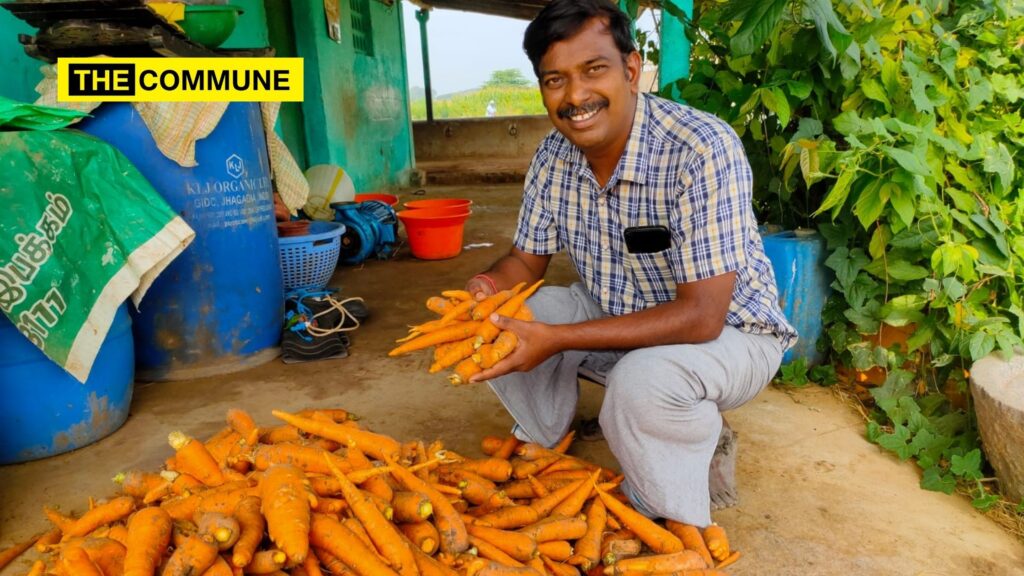Unconventional, profitable and eco-friendly- Isha Agro Movement demonstrates a novel carrot cultivation practice with pleasantly surprising results
Defying conventional farming practices, Isha Agro Movement (IAM) has cultivated carrots in the plains and reaped a bountiful harvest in Coimbatore. The carrots which were intercropped on a model farm maintained by Isha Agro Movement in Semmedu village have yielded beyond expectations– both in quality and quantity. “After 110 days, the carrot yield is impressive, better growth both in terms of weight and length than what we expected. Usually, you will get 12 to 13 carrots for a kilogram. But our farm yield is 6 to 7 carrots per kg. This has happened as a result of natural farming, without the use of any chemicals,” said Swami Srimukha, Co-ordinator- Isha Agro Movement (IAM). Traditionally, carrots have always been cultivated in hilly areas like Ooty and Kodaikanal.
For more than a decade, IAM has trained over 12,000 farmers in Tamil Nadu, in natural farming practices. “Many of them have become successful and profitable farmers. Keeping them as model farmers, from their farms, we have been giving training to new farmers in natural agriculture across Tamil Nadu,” said Swami Srimukha.
IAM maintains model farms in Coimbatore, Erode, Thiruvannamalai and Thanjavur. A total of 60 acres showcase the immense ecological and economic benefits of crop diversification and natural farming techniques. “We have intercropped not only carrots but also beetroot, radish and coriander. This time, there was no reduction in profit even though there has been heavy rainfall,” said Swami Srimukha elaborating on the benefits of natural farming techniques.
Thanks to increasing consumer awareness both about organic produce and about the disastrous ecological fallout of chemical-based farming, there is good market demand for organic produce. And not just vegetables and fruits. “We have been cultivating the traditional paddy variety Karuppu Kavuni rice naturally for the last 3 years,” said Swami. The “black rice” commands a premium in both local and overseas markets. “Last year, the yield was two quarter tons per acre which is significantly more than the yield from surrounding farms that practice chemical-based farming,” he said.
Natural farming practices have shown to increase farmer income substantially while also enhancing soil health which is deteriorating at an alarmingly rapid rate globally, turning rich fertile soil into non-cultivable sand. Global agencies such as the Food and Agriculture Organization (FAO) have warned that this loss of organic content and resultant desertification could lead to catastrophic food shortages for humanity in less than three decades.
In India, it is estimated that organic content in the soil is 0.5% or lesser. The United Nations Environment Programme (UNEP) says that a minimum of 3% organic content is vital for soil to be capable of yielding. Recognizing the imminent danger of soil degradation, the Central and State Governments in India have been promoting tree-based farming and natural farming practices through several farmer incentive schemes and government policies. More farmers will be interested to adopt organic farming if special subsidies are given to the farmers who are involved in organic farming.
Isha Agro Movement (IAM) was established in 2007 under the guidance of eminent agriculturist Nammalvar, the pioneer of organic farming movement in Tamil Nadu. It was established as a platform to develop and promote collective farming. Since 2015, Isha Agro Movement has also focused on reviving natural farming methods that were traditionally followed in India up until four decades ago. IAM provides practical support to farmers in all aspects of natural farming including training in efficient natural farming methods, value addition, marketing and procurement. Till date, over 12,000 farmers have been trained in Tamil Nadu in natural farming methods and several have converted their farms leading to improved produce, enhanced market rates and significant health benefits.
Click here to subscribe to The Commune on Telegram and get the best stories of the day delivered to you personally.

